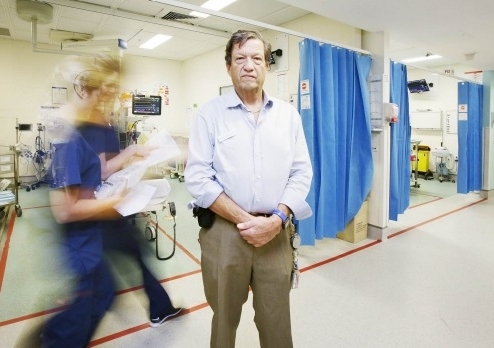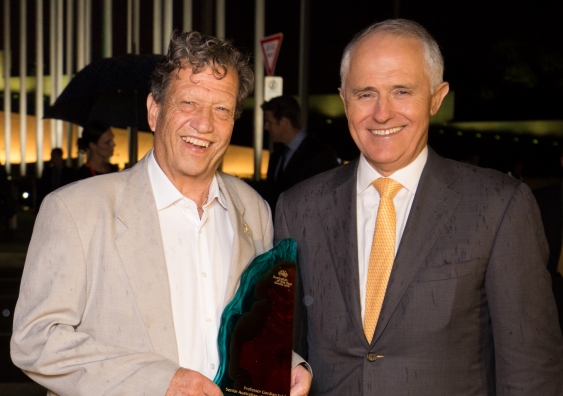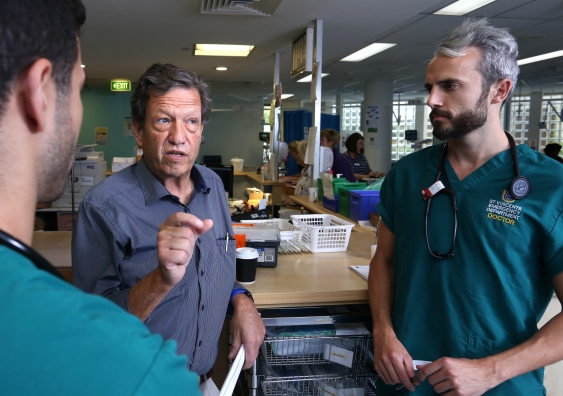When disaster strikes
Princes and paupers are the same when they are lying on a hospital gurney being treated by Gordian Fulde, the 2016 Senior Australian of the Year.
Princes and paupers are the same when they are lying on a hospital gurney being treated by Gordian Fulde, the 2016 Senior Australian of the Year.

It is just after 8am Monday in the emergency department at Sydney’s St Vincent’s Hospital. Gordian Fulde, UNSW Associate Professor of emergency medicine, is finishing his rounds, leading a swarm of doctors from bed to bed. The graveyard shift is ending and an assortment of patients with fractures, fevers and fibrillations must be handed over to the day shift.
It’s the usual weekend fallout: facial injuries from a punch-up, a pedestrian hit by a car, and an international rugby player with heart trouble. In one of the isolation rooms, a man is coming down from an ice binge.
As Fulde signs off on the handover an ambulance gurney barrels through the doors. On it is a middle-aged commuter cyclist, face bleeding, jersey torn, and clutching what staff refer to as “the green trumpet” — a whistle-like device containing the inhalable painkiller penthrox. The man’s collarbone juts out abnormally, and later scans reveal broken ribs and internal injuries.
“It’s not fair is it?” Fulde says to the man as he is whisked past.
“Not at my age,” the cyclist replies with a wan smile.
Those people who die in front of your eyes, who you form a human relationship with, they stay with you.
As the star of the hit reality TV series Kings Cross ER, Fulde is something of a household name. But more importantly, after 30 years on the frontlines of Australia’s busiest emergency rooms he is also an outspoken advocate on the social issues that see his waiting room overflow each weekend: mental health and homelessness, drugs and alcohol, and a proliferation of casual violence that would have been unthinkable three decades ago.
But behind every sensational headline and political point scored, there is a human face, and Fulde, who in January was named Senior Australian of the Year for his ongoing contribution to the community, has seen them all.
“We have the most rich, most powerful people, sometimes even in the world, and at the same time the most socially powerless and disenfranchised,” says Fulde of his patients.
“They can be in one bed to the next and it’s absolutely brilliant. And we treat them all the same.”
It is an approach that resonated with the Australia Day Council. Announcing the 2016 winners of the Australian of the Year, Prime Minister Malcolm Turnbull described Fulde and his fellow state finalists as “shining examples of our best selves”.

Fulde with PM Malcolm Turnbull at the Australian of the Year Awards. Photo: Supplied
But emergency medicine hasn’t always been so glamorous.
Fulde knew from “well before the age of 10” that he wanted to follow his German-born parents into medicine. His father was a cardiothoracic surgeon and his mother a pathologist.
After training at the University of Sydney, Fulde went into general surgery where, as fate would have it, he took a job at Sutherland Hospital requiring him to also oversee the emergency department.
My mother never forgave me, but I knew I’d found what I really wanted to do.
“Traditionally, emergency was the pits,” he says. “In terms of appeal, it was up there with the toilets and roach motels.”
There was no triage system, no career path. The bells and whistles of modern emergency medicine were little more than science fiction.
Yet Fulde found himself falling under the department’s spell, spending less and less time in the operating theatre until eventually, he decided to put the scalpel down.
“My mother never forgave me, but I knew I’d found what I really wanted to do.”
When the very first emergency medicine exams were held in the UK, Fulde was the third person in the world to sign up – and the first to pass.
A pioneer of the field, in 1982 Fulde was appointed St Vincent’s Director of Emergency and went on to found the Australasian College of Emergency Medicine, cementing it as a stand-alone specialty.
“I am the only person standing, let alone working, from that [founding] era,” says Fulde. “It was a significant thing … to have been a part of. And I’m still here.”
Straddling the outskirts of the CBD and Sydney’s red light district, St Vincent’s emergency department is the canary in the coalmine, says Fulde. “If there’s a new recreational drug, chances are we will see it first. If there is a trend in heart attacks, kidney stones, pneumonia, or whatever, we’re the first to sense something’s not right.”
In the 1980s and ’90s, the hospital was on the frontlines of Sydney’s AIDS epidemic, and more recently was designated the city’s SARS responder. It is fully equipped for a natural disaster or extremist attack and during the Lindt café siege Fulde’s teams were on standby to receive the first wave of victims. This skill-set led the Australia Day Council to describe Fulde as the “doctor on call when disaster strikes”.

There’s no real training that will prepare you … Fulde with his ED consultants. photo St Vincent’s Hospital
Located in Darlinghurst, on the road to Kings Cross, the ED also has a reputation for “sex, drugs and rock 'n' roll” patients, perhaps unfairly, given the lion’s share of work is with the sick and elderly. Though use of the stimulant drug ice gets a lot of media and political attention, Fulde says alcohol remains the number one culprit in substance-related emergency presentations.
But a new culture of violence is what troubles Fulde most.
“Someone thinks you have stolen their parking spot and they will scratch your car, or punch your head in,” he says. “Thirty years ago, that was unthinkable. Now women get assaulted, and no one is surprised.”
As soon as Fulde finishes with one patient, another arrives. Emergency medicine moves at a frenetic pace. Fulde typically does 10 things simultaneously and at speed, often forgetting to eat. He says emergency medicine is not for everybody.
“You have to be a people person, and really cope with anything that’s thrown at you,” he says.
Burnout is a real concern, and the stress and shift work can end in divorce, drinking or worse.
There is no real training that will help you. And that’s the really horrible part.
Patients who leave home thinking today will be like any other day can, and do, die, leaving Fulde with grieving families who never had a chance to say goodbye.
“There is no real training that will help you. And that’s the really horrible part,” he says.
Every emergency physician has their triggers and coping mechanisms. As a father of two daughters, Fulde often goes home after treating a young female patient and hugs his children extra tight.
“Has it made me say live every day to the fullest? No. It comes down to your philosophy of fate, or religion, or superstition,” he says.
“The key is to appreciate what you’ve got – love, your family – that can really sustain you.”
Fulde’s wife of more than 30 years, medical administrator Lesley Forster, is the head of the UNSW Rural Clinical School. Their daughters are also UNSW-trained doctors at St Vincent’s.
When asked which memories have stayed with him from his more than 30 years in emergency, Fulde says the most poignant events aren’t necessarily the most dramatic.
“Those people who die in front of your eyes, who you form a human relationship with, they stay with you. As they should.”
The stakes can be high, but so too the rewards. There are few areas of medicine where you can make such a profound difference to nearly everyone you see. His mantra is a simple one: prime minister or pauper, you are first and foremost a patient.
“You treat everybody the same, as though they were a loved one, and you play everybody down the wicket,” he says.” I’ve got no axe to grind.”